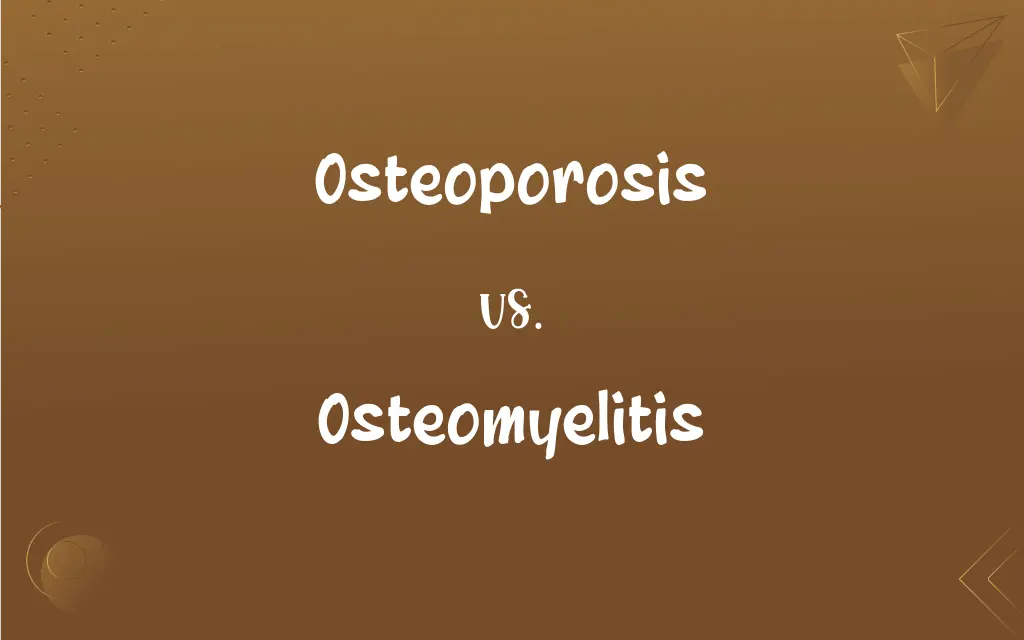Osteoporosis vs. Osteomyelitis: What's the Difference?
Edited by Aimie Carlson || By Harlon Moss || Updated on December 11, 2023
Osteoporosis is a condition of weakened bones due to density loss, while osteomyelitis is an infection in the bones.

Key Differences
Osteoporosis is characterized by the reduction of bone density, making bones fragile and more prone to fractures. Osteomyelitis, on the other hand, is an inflammatory condition caused by a bone infection, often bacterial.
The primary cause of osteoporosis is aging and hormonal changes, especially in postmenopausal women. Osteomyelitis is usually caused by a bacterial infection, which may enter the bone due to injury or surgery.
Osteoporosis is often asymptomatic until a fracture occurs. Osteomyelitis presents with localized pain, fever, and swelling over the affected bone.
Treatment for osteoporosis includes medication to strengthen bones, dietary changes, and exercise. Osteomyelitis treatment typically involves antibiotics and sometimes surgery to remove infected bone tissue.
Preventive measures for osteoporosis include adequate calcium and vitamin D intake, and regular exercise. Preventing osteomyelitis involves proper wound care and hygiene to avoid infection.
ADVERTISEMENT
Comparison Chart
Word Origin
From Greek 'osteon' (bone) and 'poros' (pore)
From Greek 'osteon' (bone) and 'myelos' (marrow), with '-itis' indicating inflammation
Part of Speech
Noun
Noun
Usage in Sentence
Describes a condition
Describes an infection
Syllables
5 (os-te-o-po-ro-sis)
6 (os-te-o-my-e-li-tis)
Pronunciation
/ˌɒstɪəˈpəʊrəsɪs/
/ˌɒstɪəʊˌmaɪəˈlaɪtɪs/
ADVERTISEMENT
Osteoporosis and Osteomyelitis Definitions
Osteoporosis
A bone disease causing decreased density and strength.
Her diagnosis of osteoporosis explained her frequent fractures.
Osteomyelitis
An infection in the bone, often bacterial.
The patient was diagnosed with osteomyelitis after a persistent fever.
Osteoporosis
A condition where bones become brittle and fragile.
Regular exercise can help prevent osteoporosis.
Osteomyelitis
A serious bone disease caused by microorganisms.
Osteomyelitis can sometimes require surgical intervention.
Osteoporosis
A loss of bone mass and density over time.
Postmenopausal women are at higher risk for osteoporosis.
Osteomyelitis
An infection leading to bone destruction and abscess.
He developed osteomyelitis following a severe bone fracture.
Osteoporosis
A skeletal disorder characterized by weakening bones.
Osteoporosis is particularly common in older adults.
Osteomyelitis
Inflammation of bone marrow and adjacent bone.
Chronic osteomyelitis is a long-term complication in some cases.
Osteoporosis
A progressive bone disease increasing fracture risk.
He takes calcium supplements to manage his osteoporosis.
Osteomyelitis
A bacterial or fungal infection affecting bones.
Antibiotics are essential for treating osteomyelitis.
Osteoporosis
A disease characterized by a decrease in bone mass and density, occurring especially in postmenopausal women, resulting in a predisposition to fractures.
Osteomyelitis
A usually bacterial infection of bone and bone marrow in which the resulting inflammation can lead to a reduction of blood supply to the bone.
Osteoporosis
(pathology) A disease, occurring especially in women following menopause, in which the bones become extremely porous and are subject to fracture.
Osteomyelitis
(pathology) An infection of the bone
Osteoporosis
An absorption of bone so that the bone tissue becomes unusually porous. It occurs especially in elderly men and postmenopausal women, and predisposes the elderly to fractures of the bones.
Osteomyelitis
An inflammation of bone and bone marrow (usually caused by bacterial infection)
Osteoporosis
Abnormal loss of bony tissue resulting in fragile porous bones attributable to a lack of calcium; most common in postmenopausal women
FAQs
Is osteomyelitis contagious?
No, it's not contagious.
What is osteoporosis?
A condition where bones become weak and brittle.
Who is at risk for osteoporosis?
Older adults, especially postmenopausal women.
What causes osteomyelitis?
It's typically caused by a bacterial infection.
What are the symptoms of osteomyelitis?
Symptoms include pain, fever, and swelling.
How is osteoporosis diagnosed?
Through bone density tests.
Is osteomyelitis a serious condition?
Yes, it can be severe and require immediate treatment.
Can osteoporosis be cured?
There's no cure, but treatments can help manage it.
Are there medications for osteoporosis?
Yes, like bisphosphonates.
What lifestyle changes help with osteoporosis?
Diet, exercise, and avoiding smoking and excessive alcohol.
What's the prognosis for osteomyelitis?
With treatment, most people recover fully.
Does osteoporosis affect men and women differently?
Yes, women are more commonly affected.
Can children get osteomyelitis?
Yes, though it's more common in adults.
How long does it take to recover from osteomyelitis?
Recovery can take weeks to months, depending on severity.
What role does calcium play in osteoporosis?
Calcium is crucial for bone health and density.
Can osteomyelitis be prevented?
Good hygiene and prompt treatment of infections can help.
Is exercise safe for people with osteoporosis?
Yes, but it should be low-impact and safe.
Can osteoporosis lead to other health issues?
Yes, like fractures and reduced mobility.
Can osteomyelitis recur?
Yes, especially if not fully treated.
Can osteomyelitis spread to other parts of the body?
Yes, if not treated promptly.
About Author
Written by
Harlon MossHarlon is a seasoned quality moderator and accomplished content writer for Difference Wiki. An alumnus of the prestigious University of California, he earned his degree in Computer Science. Leveraging his academic background, Harlon brings a meticulous and informed perspective to his work, ensuring content accuracy and excellence.
Edited by
Aimie CarlsonAimie Carlson, holding a master's degree in English literature, is a fervent English language enthusiast. She lends her writing talents to Difference Wiki, a prominent website that specializes in comparisons, offering readers insightful analyses that both captivate and inform.































































